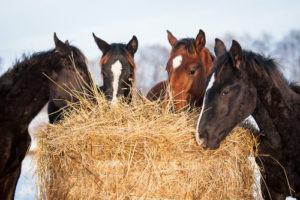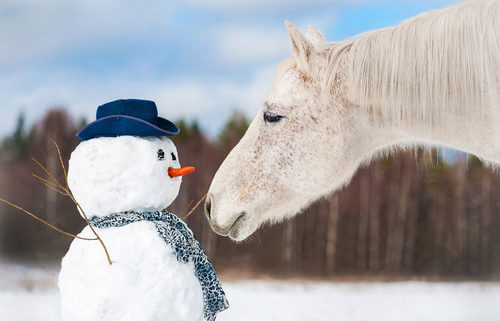Horses can stay outdoors for the majority of the winter if they’re properly prepared and tended. As a horse owner, it’s your responsibility to ensure that your horse is ready for the coming winter. By taking smart precautions and caring for your horse the right way, you can help keep your horse healthy this winter.
Ensure Good Health from the Start
Before winter comes, have your horse thoroughly examined by the veterinarian. Your horse’s veterinarian can help you determine whether or not your horse is ready for the coming winter. Be sure to have your horse de-wormed and immunized (if your horse is due for immunizations) before the winter begins.
Let Your Horse’s Coat Grow
Horses will grow a thick coat as the weather begins to cool. This coat is natural, and is your horse’s best defense against cold weather, snow and rain. Allow your coat’s horse to become as thick as possible to help ensure that your horse will be comfortable this winter.
Provide a Blanket if Necessary
Stabled horses will benefit from use of a blanket when brought outside for the day, but horses that live outdoors should have a thick enough coat to stay warm without a blanket. If you need to provide a blanket for your horse, buy the best quality blanket possible. Blankets that are too thin will reduce your horse’s ability to keep himself warm by matting down his coat, and will not provide proper protection from the cold air.
Provide Extra Calories
Horses need to eat more food during the winter to keep up their weight. Doing this helps your horse stay warm over the course of the winter. The exact amount of extra food you should feed your horse will depend on your horse’s age, health and, for female horses, whether or not your horse is pregnant.
To find out how much you should be feeding your horse this winter, consult with your horse’s veterinarian. Remember that a horse’s winter coat will hide weight loss, so you’ll need to pay extra attention to ensure that your horse is not losing weight without your knowledge. Get in the habit of feeling your horse’s ribs to check his or her weight. For a healthy horse, you should be able to feel your horse’s ribs through the coat if you apply a little pressure.
Ensure Adequate Water Supply
Your horse should drink between 8 and 12 gallons on a daily basis, but freezing water can prevent your horse from getting enough to drink throughout the day. To prevent the water from freezing, place a basketball or soccer ball in the water supply, and position the water in a warm, sunny location. If the water is stored in an area that experiences hard freezes throughout the winter, use a water heater to ensure that your horse has access to water throughout the day and night.
Shop for Products with the NASC Quality Seal
The goal of the National Animal Supplement Council (NASC) is to promote the health and well-being of companion animals and horses that are given animal health supplements by their owners, and to protect and enhance the integrity of the animal health product industry. When you see the NASC Quality Seal on animal health supplements, you can trust you are buying from a reputable company that has successfully completed an independent quality audit and has complied with rigorous requirements necessary to gain permission to display the Quality Seal. To learn more, and to access meaningful information on all aspects of health and wellness for dogs, cats and horses, visit AnimalHealthLive.com.



